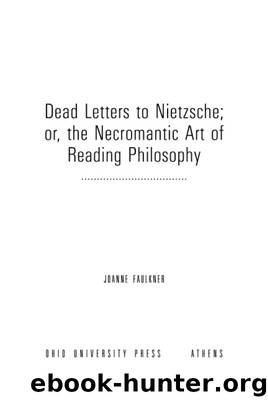Dead Letters to Nietzsche, or the Necromantic Art of Reading Philosophy by Faulkner Joanne;

Author:Faulkner, Joanne;
Language: eng
Format: epub
Publisher: Ohio University Press
Published: 2010-08-15T00:00:00+00:00
Inside and Outside: Nietzsche “Incorporated”;
or, who Incorporates Whom in the Act
of Reading Nietzsche?
I resign. I wouldn’t want to belong to any club that would have me as a member.
—Groucho Marx
Nietzsche’s writings are fascinating objects of study for psychoanalysis, expressing as they do the contradictory impulses of containment and dissolution. For while on the one hand Nietzsche puts in question the possibility of identity as we understand it—and, in Ecce Homo, the integrity of his own identity in particular—we also find in his work an anxiety about the corruptibility of this “self” by the other. Nietzsche may have anticipated, even welcomed the reader’s participation in the production of his texts, but he did not do so without reservation. He desired only to admit “the right sort” of reader to his inner-circle—the secret society of Nietzsche esoterica. Nietzsche’s frequent expressions of disquiet about the possibility of being appropriated by the wrong sort of reader signals not only an anxiety about being misread—about the distortion of his texts’ meaning—but also, what for Nietzsche amounts to the same thing, a qualm of appetite. What Nietzsche did not want was to be incorporated within the wrong sort of digestive tract, and to have to mix with the filth of common entrails. Above all, he did not want to offend his own senses—to be reduced to “a barrel organ song” within the other’s botched interpretation of him.
Perhaps we would be in a better position to understand the esoteric address as an effect of interpellation, if we were to read this relation precisely as Nietzsche said we ought not to do: that is, in terms of inclusion or exclusion, rather than height, or an order of rank. For it is entirely possible that Nietzsche concealed the operation of his text upon the reader beneath this interpretative prohibition, and that the text incorporates the reader precisely by appealing to the notion of rank as a lure for their vanity. Literally, the esoteric meaning addresses the inside; by contrast, exoteric pertains to the outside. By signaling two parallel lines of meaning—two lines that cannot intersect—Nietzsche appears to evade the danger of corruption that invariably attends interpretation. Incorporation differentiates outside from inside, and so to this extent keeps the self discrete and intact. But its intermediate status signifies an intolerable threat of contamination, whereby inside and outside become confused. As Maggie Kilgour writes: “The idea of incorporation . . . depends upon and enforces an absolute division between inside and outside; but in the act itself that opposition disappears, dissolving the structure it appears to produce.”[17] The possibility that an unwanted and unwarranted outside might intrude gives rise to the fear of “an enemy within” that could usurp the authority of the self: then Nietzsche might end up a mere puppet in the hands of exterior agencies, his name signifying a different content to the one he had given it.
Yet if one type of reader were already inside, and the other rigorously external, then the proper addressee—the initiate—would be merely
Download
This site does not store any files on its server. We only index and link to content provided by other sites. Please contact the content providers to delete copyright contents if any and email us, we'll remove relevant links or contents immediately.
What's Done in Darkness by Kayla Perrin(25501)
Shot Through the Heart: DI Grace Fisher 2 by Isabelle Grey(18220)
Shot Through the Heart by Mercy Celeste(18160)
The Fifty Shades Trilogy & Grey by E L James(17777)
The 3rd Cycle of the Betrayed Series Collection: Extremely Controversial Historical Thrillers (Betrayed Series Boxed set) by McCray Carolyn(13190)
The Subtle Art of Not Giving a F*ck by Mark Manson(12915)
Scorched Earth by Nick Kyme(11834)
Stepbrother Stories 2 - 21 Taboo Story Collection (Brother Sister Stepbrother Stepsister Taboo Pseudo Incest Family Virgin Creampie Pregnant Forced Pregnancy Breeding) by Roxi Harding(11040)
Drei Generationen auf dem Jakobsweg by Stein Pia(10217)
Suna by Ziefle Pia(10186)
Scythe by Neal Shusterman(9265)
International Relations from the Global South; Worlds of Difference; First Edition by Arlene B. Tickner & Karen Smith(8614)
Successful Proposal Strategies for Small Businesses: Using Knowledge Management ot Win Govenment, Private Sector, and International Contracts 3rd Edition by Robert Frey(8419)
This is Going to Hurt by Adam Kay(7698)
Dirty Filthy Fix: A Fixed Trilogy Novella by Laurelin Paige(6454)
He Loves Me...KNOT by RC Boldt(5805)
How to Make Love to a Negro Without Getting Tired by Dany LaFerrière(5378)
Interdimensional Brothel by F4U(5305)
Thankful For Her by Alexa Riley(5164)
